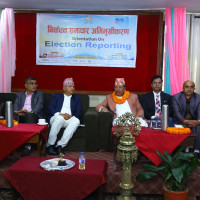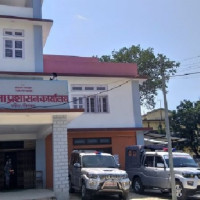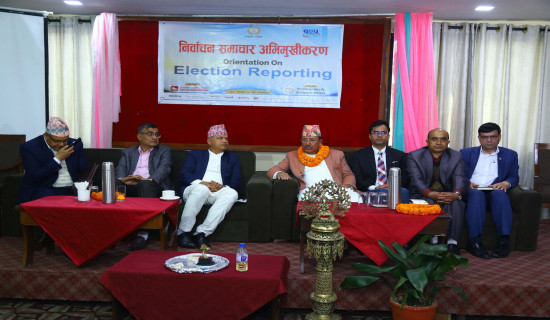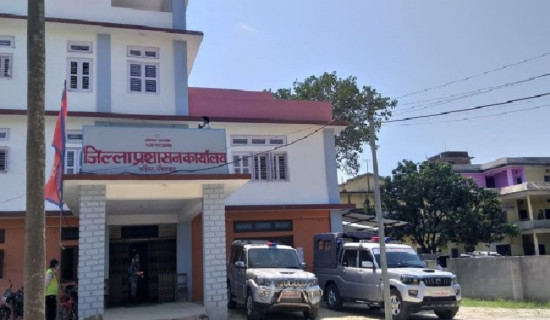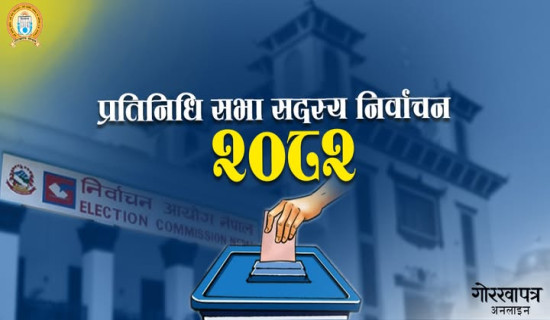- Sunday, 22 February 2026
'Only one of ten infected shows symptoms of dengue'
By Mahima Devkota, Kathmandu, Aug 18: Medical doctors have said that only 10 percent of the people infected with dengue show symptoms, while 90 per cent of the infected are asymptomatic, therefore, it is a must to
contain dengue before it spreads in communities.
Dr. Anup Bastola, former director of Sukraraj Tropical and Infectious Disease Hospital, said, "Out of the ten thousand people infected by dengue in the community only one thousand infected people show symptoms. Of which, 500 infected people show symptoms of viral fever and the other 500 show symptoms of dengue fever."
He said that symptoms such as high fever, headache,
pain in the eyeball, back pain, joint and muscle pain, nausea or vomiting, and
small lumps on the body are observed in patients with dengue. Small red rashes can be seen all over the body while
recovering from dengue.
However, some might develop severe dengue, with symptoms such
as fatigue, bleeding gums, extreme stomach pain, repetitive vomiting, difficulty
in breathing, and swelling of the stomach and legs, in such cases, they should be
immediately rushed to the hospital.
He said, "Minimizing or being safe from a mosquito
bite is the best prevention and control of dengue, along with, intensifying campaign
search and destroy the campaign of mosquito larvae."
According to Dr. Gokarna Dahal, head, NTD and Vector
Borne Disease Control Division under the EDCD, said many people are asymptomatic and
only a few show symptoms of dengue infection, therefore, avoiding its spread in
the community helps to contain the infection.
More than 900 cases of dengue were detected from
January till mid-June this year in Nepal. This year, many cases of dengue were
detected in Bagmati and Lumbini provinces.
The cases of dengue rise with the onset of monsoon
season every year said Dr. Dahal and added that more than 500 cases of dengue
were detected in 58 districts last year. The dengue cases will increase in the next three months, he added.
Dengue was first observed in Nepal in the year 2004, and since then dengue has been observed each year. Nepal dealt with the dengue
epidemic in the year 2019. Not only in the terai belts but dengue is spread in
the hilly region of the country.
Dr. Samir Mani Dixit, a public health expert, said
that measures that can be applied to be protected from mosquito bites are using
shields on doors and windows, using mosquito nets, wearing full shelves, or
using mosquito repellant creams while going out, especially during morning and
evening.
Mosquitos grow in stagnant water; especially water
collected in discarded drums, vehicle tires, and discarded bags. Therefore,
there is a need to be aware of it.
According to Dr. Sameer Kumar Adhikari, spokesperson
at the Ministry of Health and Population, dengue can be avoided by preventing
mosquito bites and mosquito breeding areas.
Dr. Adhikari suggested using insect repellent, wearing
full-sleeve clothes, using a mosquito net, and emptying possible mosquito breeding
items that hold water, such as tires, buckets, planters, pools, toys,
flowerpots, or trash containers.
“We have alerted all concerned agencies about the risk of
the spread of dengue and asked them to take extra precautions,” he said.



-original-thumb.jpg)
